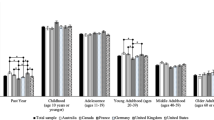Abstract
OBJECTIVE: To investigate the internalization of anti-fat bias among overweight individuals across a variety of attitudes and stereotypes.
DESIGN: Two studies were conducted using the Implicit Association Test (IAT), a performance-based measure of bias, to examine beliefs among overweight individuals about ‘fat people’ vs ‘thin people’. Study two also contained explicit measures of attitudes about obese people.
SUBJECTS: Study 1 participants were 68 overweight patients at a treatment research clinic (60 women, 8 men; mean Body Mass Index (BMI) of 37.1±3.9 kg/m2). Study 2 involved 48 overweight participants (33 women, 15 men) with a BMI of 34.5±4.0 kg/m2.
RESULTS: Participants exhibited significant anti-fat bias on the IAT across several attributes and stereotypes. They also endorsed the explicit belief that fat people are lazier than thin people.
CONCLUSION: Unlike other minority group members, overweight individuals do not appear to hold more favorable attitudes toward ingroup members. This ingroup devaluation has implications for changing the stigma of obesity and for understanding the psychosocial and even medical impact of obesity on those affected.
This is a preview of subscription content, access via your institution
Access options
Subscribe to this journal
Receive 12 print issues and online access
$259.00 per year
only $21.58 per issue
Buy this article
- Purchase on Springer Link
- Instant access to full article PDF
Prices may be subject to local taxes which are calculated during checkout
Similar content being viewed by others
References
Puhl R, Brownell KD . Bias, discrimination, and obesity. Obes Res 2001; 9: 788–805.
Greenberg BS, Eastin M, Hofshire L, Lachlan K, Brownell KD . The portrayal of overweight and obese persons in commercial television. Am J Public Health 2003; 93: 1342–1348.
Tajfel H, Turner JC . Social identity theory of intergroup behavior. In: Worchel S, Austin WG (eds). Psychology of Intergroup Relations. Nelson-Hall: Chicago; 1986. pp 7–24.
Rudman LA, Feinberg J, Fairchild K . Minority members’ implicit attitudes: automatic ingroup bias as a function of group status. Soc Cogn 2002; 20: 294–320.
Schwarz N . Self-reports: How the questions shape the answers. Am Psychol 1999; 54: 93–105.
Nisbett RE, Wilson TD . Telling more than we can know: verbal reports on mental processes. Psychol Rev 1977; 84: 231–359.
Greenwald AG, Banaji M . Implicit social cognition: attitudes, self-esteem, and stereotypes. Psychol Rev 1995; 105: 4–27.
Rudman LA, Ashmore RD, Gary ML . ‘Unlearning’ automatic biases: the malleability of implicit prejudice and stereotypes. J Pers Soc Psychol 2001; 81: 856–868.
Bessenhoff GR, Sherman JW . Automatic and controlled components of prejudice toward fat people: evaluation versus stereotype activation. Soc Cogn 2000; 18: 329–353.
Dovidio JF, Kawakami K, Johnson C, Johnson B, Howard A . On the nature of prejudice: implicit and controlled processes. J Exp Soc Psych 1997; 33: 510–540.
Dovidio JF, Kawakami K, Gaertner SL . Implicit and explicit prejudice and interracial interactions. J Pers Soc Psych 2002; 82: 62–68.
Wilson TD, Lindsey S, Schooler TY . A model of dual attitudes. Psychol Rev 2000; 107: 101–126.
Greenwald AG, McGhee DE, Schwartz JLK . Measuring individual differences in implicit cognition: the implicit association test. J Pers Soc Psychol 1998; 74: 1464–1480.
Teachman BA, Brownell KD . Implicit anti-fat bias among health professionals: is anyone immune? Int J Obes Relat Metab Disord 2001; 25: 1525–1531.
Teachman BA, Gapinski KD, Brownell KD, Rawlins M, Jeyaram S . Demonstrations of implicit anti-fat bias: the impact of providing causal information and evoking empathy. Health Psychol 2003; 22: 68–78.
Ofosu HB, Lafreniere KD, Senn CY . Body image perception among women of African descent: a normative context? Feminism Psychol 1998; 8: 303–323.
Cohen J . Statistical Power Analysis for the Behavioral Sciences, 2nd edn. Erlbaum: Hillsdale, NJ; 1988.
Allison DB, Basile VC, Yuker HE . The measurement of attitudes toward and beliefs about obese persons. Int J Eating Disord 1991; 10: 599–607.
Petty RE, Fleming MA, White PH . Stigmatized sources and persuasion: prejudice as a determinant of argument scrutiny. J Pers Soc Psychol 1999; 76: 19–34.
Gluck ME, Geliebter A . Racial/ethnic differences in body image and eating behaviors. Eating Behav 2002; 3: 143–151.
Quinn DM, Crocker J . When ideology hurts: effects of belief in the Protestant ethic and feeling overweight on the psychological well-being of women. J Pers Soc Psychol 1999; 77: 402–414.
Tiggemann M, Anesbury T . Negative stereotyping of obesity in children: the role of controllability beliefs. J Appl Soc Psychol 2000; 30: 1993–1997.
Anesbury T, Tiggemann M . An attempt to reduce negative stereotyping of obesity in children by changing controllability beliefs. Health Ed Res 2000; 15: 145–152.
Acknowledgements
We thank Rebecca Rothman and Stephanie Sargent for their assistance with data collection. Portions of this study were presented in October 2001 at the meeting of the North American Association for the Study of Obesity, Quebec, Canada. This research was supported by NIH grant DK56124-03 and by an unrestricted educational grant from Abbott Laboratories (both to Dr Wadden).
Author information
Authors and Affiliations
Corresponding author
Rights and permissions
About this article
Cite this article
Wang, S., Brownell, K. & Wadden, T. The influence of the stigma of obesity on overweight individuals. Int J Obes 28, 1333–1337 (2004). https://doi.org/10.1038/sj.ijo.0802730
Received:
Revised:
Accepted:
Published:
Issue Date:
DOI: https://doi.org/10.1038/sj.ijo.0802730
Keywords
This article is cited by
-
BMI and perceived weight on suicide attempts in Korean adolescents: findings from the Korea Youth Risk Behavior Survey (KYRBS) 2020 to 2021
BMC Public Health (2023)
-
The Relationship Between Body Mass Index, Implicit Weight Bias, and Social Anxiety in Undergraduate Women
Cognitive Therapy and Research (2023)
-
Effectiveness of different types of mental simulation in the weight loss process based on a perseverance study among people with different BMI
Archives of Public Health (2021)
-
Social stigma and self-esteem as mediators of the relationship between Body Mass Index and Internet addiction disorder. An exploratory study
Current Psychology (2021)
-
Cereal Deal: How the Physical Appearance of Others Affects Attention to Healthy Foods
Perspectives on Behavior Science (2020)


